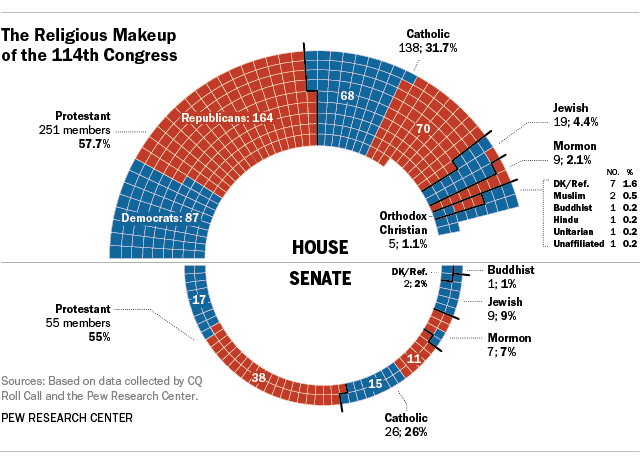Number crunchers at the Pew Research Center have released their breakdown by faith of the members of the incoming 114th Congress.
Turns out that in 2015 most of them are Republicans!
Wait, scratch that, Christians remain the number one religious group in Congress no matter which party controls the House and Senate (and tomorrow for the first time since the 109th Congress in 2005, that will be all-GOP baby).
According to Pew, more than nine-in-ten members of the House and Senate (92 percent) are Christian, and about 57 percent are Protestant, roughly the same as in the 113th Congress—90 percent and 56 percent, respectively—that had been split by Democrats (Senate) and Republicans (House). About three-in-ten members (31 percent) are Catholic, the same as in the previous Congress.
This combined Christian bloc continue to make up a greater percentage of the members of Congress than of all U.S. adults—49 percent of American adults are Protestant and 22 percent are Catholic.
Pew finds that there still remains little room for atheists and agnostics and none-of-the-aboves in congressional aisles: “As was the case in the 113th Congress, the biggest difference between Congress and the general public is in the share of those who say they are religiously unaffiliated. This group makes up 20 percent of the general public but just 0.2 percent of Congress.” In fact the only member of Congress who describes herself as religiously unaffiliated is Rep. Kyrsten Sinema, D-Ariz.
Among the study’s other findings:
· Many of the nation’s smaller religious groups are represented in roughly equal proportion to their numbers in the U.S. adult population. Buddhists, Muslims and Hindus combined represent roughly 2 percent of American adults and 1 percent of Congress. Jews continue to have greater representation in Congress (5 percent) than in the population as a whole (2 percent), but there are five fewer Jewish members in the 114th Congress than there were in the 113th, and 11 fewer than there were in the 112th Congress.
· The new Congress includes a number of people who have had some form of religious occupation, including at least seven members who are ordained ministers.
· Of the 301 Republicans scheduled to be sworn in on Jan. 6, only one—freshman Rep. Lee Zeldin of New York’s 1st District – is not a Christian. Zeldin is Jewish.
· Fully two-thirds of the Republicans in the 114th Congress (202 members, or 67 percent) are Protestant, about a quarter are Catholic (81, or 27 percent) and 5 percent are Mormon (14).
· Democrats in the new Congress are somewhat more religiously diverse than Republicans, though not as diverse as the population as a whole. Of the 234 Democrats in the 114th Congress, 104 (44 percent) are Protestant, 83 (35 percent) are Catholic, 27 (12 percent) are Jewish, two (1 percent) are Mormon, two are Buddhist, two are Muslim, one is Hindu and one does not identify with a particular religion.
I know what you’re thinking: All these denominational figures sure are interesting, but what percentage of this incoming Congress has been educated by the Jesuits? Nine percent of them, says the Association of Jesuit Colleges and Universities, which reports that among the fighting 114th’s 535 Members, 47 are alumni of Jesuit institutions; seven of whom were newly elected this year. There are 11 Jesuit alumni in the Senate and 36 in the House of Representatives.
"We are proud that nine percent of Congress are alumni/ae of Jesuit colleges and universities,” said AJCU President Rev. Michael J. Sheeran, S.J. “We are grateful for their leadership, and we look forward to strengthening the excellent working relationships we have already established with those in Congress and forging ties with new members of the 114th Congress.”
Representative John Boehner (R-OH, Xavier University) is serving his third term as Speaker of the House of Representatives and Representative Steny Hoyer (D-MD, Georgetown University) continues to serve as the House Minority Whip. In the Senate, the association says Senator Richard Durbin (D-IL, Georgetown University) serves as the Assistant Minority Leader. Of the 47 alumni, seven were newly elected in 2014.
Of note, Representative Debbie Dingell (D-MI, Georgetown University) succeeds her husband, Representative John D. Dingell (D-MI), a Georgetown University alumnus who was the longest-serving Member of Congress in history (1955 – 2015). There are currently 13 Jesuit colleges and universities represented by alumni in the U.S. Congress. Georgetown University has the most alumni with a total of 23, followed by Boston College with six and Fordham University with four. The College of the Holy Cross has three, while Creighton University and Saint Peter’s University both have two alumni represented. The remaining schools with alumni/ae in Congress are Loyola University Chicago, Loyola University Maryland, Marquette University, Saint Joseph’s University, University of Detroit Mercy, Wheeling Jesuit University and Xavier University.








